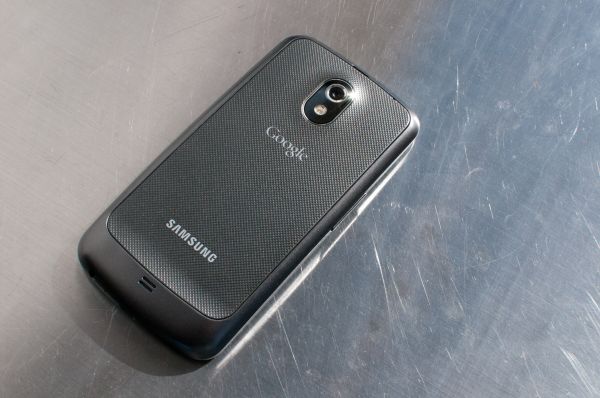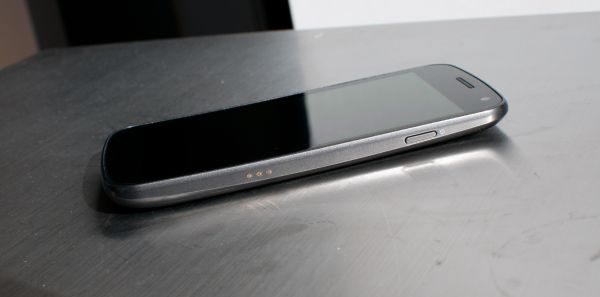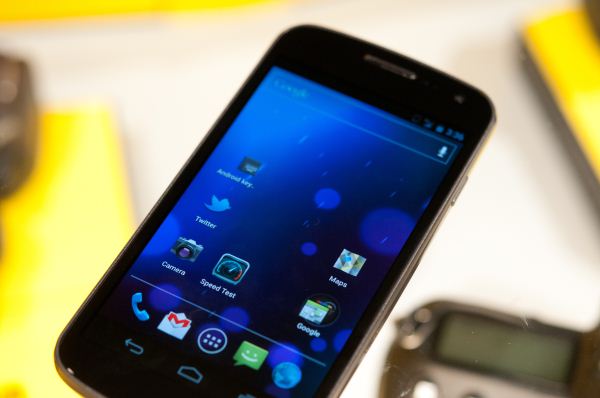Samsung Galaxy Nexus & Ice Cream Sandwich Review
by Brian Klug & Anand Lal Shimpi on January 18, 2012 1:34 PM ESTFor Google, one of the major points of Nexus has always been to provide a stable piece of reference hardware for it to cater a major OS release to. Each device has married a major revision of the Android platform to the latest stable hardware. That isn't to say that the hardware choices are always bleeding edge, but rather modern and logical next steps for the platform. I often read that Android as a platform is plagued by rapid hardware releases and product cycles that leave endless variants of the same hardware for each carrier, and that preloads and skins fragment the experience. While there's some truth to this, it isn't necessarily Google's fault - the software is open source after all. In the case of Android 4.0, this release is about consolidating the tablet and smartphone form factors under one version of Android and negating some talk of the platform's fragmentation.
For Google, each Nexus launch is analogous to Apple's iPhone launch - it's the one time that Google gets to dictate exactly what hardware is coming out, and exactly what software makes it onto that hardware. It is no less significant for Google's platform, either. Thus far there's been one Nexus device released per year, and that hardware gets updates from Google directly - at least until the hardware precludes support.
While the Verizon CDMA/LTE Galaxy Nexus is a bit unique, there's no indication thus far about how long carrier approval will take. The Galaxy Nexus line itself is very interesting - on one side, we have the GSM/UMTS device with pentaband WCDMA support that finally fully detaches the hardware from needing carrier specific versions for each region or carrier on GSM/UMTS networks. This is a dramatic step toward reducing carrier power, turning the networks into dumb pipes, and changing the way US customers shop for devices - exactly what the point was when Google launched the Nexus One. On the other, we have the Verizon CDMA/LTE version which thus far marks the furthest carrier incursion into otherwise untouched Nexus-land.
At this point, the Galaxy Nexus is awesome because of its marriage of Android 4.0 and a number of unique hardware features. I'd go so far to say that the Galaxy Nexus is without question the current best Android device, and with the improvements made in Android 4.0, first party applications and browser are now nearly as smooth as their counterparts in iOS. If OS smoothness was the thing holding you back from Android, 4.0 does a lot to change that. The Galaxy Nexus display is excellent, pentaband WCDMA on the GSM/UMTS model is exclusive only to that device, battery life isn't half bad, instant capture works well, and it has Samsung's newest LTE modem. The downsides are pretty much obvious - the camera is far from awesome, the GSM/UMTS variant has a quiet speakerphone, Samsung is using OMAP4460 at 80% of its maximum clocks, and some Galaxy Nexus displays have more more inhomogeneities than others. There's also the matter of newer 32 and 28nm SoCs that are just over the horizon.
The Galaxy Nexus is so important again because it's the only time Google gets to dictate everything - the hardware, the software, and update timing. There's also the element of freedom, with unlockable hardware out of the box. I find myself wishing that Google had begun its adventure sticking it to the carriers with pentaband WCDMA support like this phone finally has, as that would've been much more successful than the practice of releasing a few different Nexus variants with different bands.
As far as Ice Cream Sandwich is concerned, it really is Android perfected. Everything is smoother, faster and nearly all of our issues with the OS have been addressed. ICS brings Android into 2012 and gives Google a great platform to begin to introduce new features going forward. Android is now very close to UI performance parity with iOS, which eliminates a major tradeoff you had to make in the past. If you were hoping for ICS to be iOS with a Google logo on it, you'll be sorely disappointed. However if you're a fan of Android and just wished it were smoother and more polished, Ice Cream Sandwich is what you've been waiting for.













185 Comments
View All Comments
HooDooMagic - Friday, January 20, 2012 - link
I think it's already been mentioned that 4.03 fixed the task switcher lag. I have alpha ICS 4.03 roms running on a Nexus One, Nook Color and Samsung Galaxy Tab 10.1 and everything runs very smoothly on all 3 devices. Even the very underpowered Nook has surprisingly little lag and stutter when using the task switcher and transitioning between screens/app drawer etc.Chloiber - Wednesday, January 18, 2012 - link
The Galaxy Nexus is a very nice phone indeed, but there are just some things that I don't like about it. As mentioned in the review, the GPU is not the best, which is actually the main reason I won't buy the phone. I buy smartphones which should last about 2 years. Buying one with a GPU from the beginning of last year is just not good enough. As Anand mentions: better wait for Q2, maybe Q3. At the moment, the GN is certainly the best phone (in my opinion) money can buy, but it's not the right moment to buy an android phone.The review is very late indeed...but very thorough - thank you!
One question remains: are microSD slots a thing of the past? Google mentioned that there is a good reason why they didn't include one (slow speeds for apps). But I still think that's a very bad reason not to include a slot. While it is true, that the mSD cards are pretty slow compared to internal storage, there is just no way in hell I'm gonna pay 100$+ for 16GB of additional internal NAND. Additionally, you don't need high speeds for music, pictures and movies (the main reason to get an SD card).
I hope for a phone in Q2/Q3 with a) better SoC, b) an SD card slot and c) a 720p IPS or SAMOLED+ screen.
humancyborg - Wednesday, January 18, 2012 - link
I agree. The GPU is a terrible oversight on this phone, particularly considering the inclusion (finally) of OpenGL rendering throughout Android.With the 4S GPU being 3-4x faster it's tough to see how this phone is going to stand the test of time. Presumably the iPad3 and next iPhone will be packing an even more powerful SoC and GPU.
This is one of the main reasons that I think Apple is in a great position going forward with regards to hardware. With the exception of Samsung, everyone else is relying on TI, Qualcomm, Intel, etc to make the right decisions with regards to CPU/GPU etc combination and clearly those chip makers do not always have the best insight with regards to product pipeline or requirements.
A retina display-ish version of the iPad is going to take a GPU far beyond anything the current SoC guys are manufacturing.
tipoo - Wednesday, January 18, 2012 - link
The next generation of PowerVR SGX graphics chips are supposedly 20x as powerful as the current ones. I'm guessing Apple will still be using the dual core variant of the 6** series. That's good, if the 4x screen resolution rumours are true.Yeesh, Android devices still haven't caught up to the old GPU now a new one is around the corner. Nvidia is stuck with their own GPU's of course, but TI or Samsung should switch to PowerVR if this performance domination continues.
trob6969 - Wednesday, January 18, 2012 - link
What performance domination?! Android phones are easily the most powerful on the market!Greg512 - Wednesday, January 18, 2012 - link
Not when it comes to GPU power. The iPhone 4S has a GPU 3-4 times as powerful as the one in the Nexus. Android phones do tend to have higher clocked processors, however, so they do have a healthy advantage on that front. Android phones also have more RAM, though many would debate that iOS is memory efficient, negating the hardware advantage.KoolAidMan1 - Wednesday, January 18, 2012 - link
You're kidding, right? The Tegra 3 is slower than the eight month old A5. Everything in Android world is playing catch-up with old parts, which is odd given that they have a more frequent upgrade cycle. Problem is that they've been behind since the beginning.doobydoo - Thursday, January 19, 2012 - link
trob6969 - the leading Android phones have CPU's which are largely comparable to the CPU in the iPhone 4S - in some cases they even boast up to ~10% extra performance (as a result of, in some cases, 50% higher clock speed), but only in CPU limited tasks, and that <10% is barely noticeable.Graphically, the GPU in the Nexus Prime is far slower than even the Samsung Galaxy S2 - using an older GPU which is up to 3x slower than the GPU in the iPhone 4S. The GPU in the SG2 (the fastest Android GPU) is also far slower than the iPhone 4S (as the benchmarks in this review show)
Because iOS is hardware accelerated (and tightly intertwined with the iPhone), the performance of the iPhone 4S and iOS is far superior to any Android phone out at this moment in time.
zorxd - Thursday, January 19, 2012 - link
uh?50% faster clock speed gives you 50% more performance in CPU limited tasks. Don't forget that it's the same architecture (Cortex A9).
I hope you are not making that 10% claim based on javascript bencmarks. They are browser benchmarks more than CPU benchmarks.
Zoomer - Thursday, January 19, 2012 - link
Not really, the A9 ISA have many different architecture implantations. TI does their own, Apple probably did their own, and I believe nVidia has their own too.